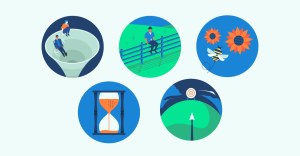Many salespeople have learned that the psychology of and personality types behind potential customers and contacts is just as important to study as the businesses they represent.
Below are some of the common personality types that you may encounter in your sales career, as well as a brief overview of how to best interact with them to close the sale.
The Straight Shooter
This may be the ideal customer—someone who already knows what they want and is completely clear about it. They have made contact with your company because they are ready to make a purchasing decision and are eager to get started.
For these types of customers, it is key to be responsive, concise, and flexible. They are ready to make a purchase, so develop a package of offerings tailored to their exact specifications and you’ll be even closer to guaranteeing a sale. With flexibility should also come conciseness. Outline your deliverables so it’s clear what is being offered. Straight shooters don’t like being yanked around. They want what they want, and you shouldn’t try to one-up them if it’s not what they are looking for. Respond in a timely manner and don’t wait to get a better contract.
The 5 Personality Types of Your Customers
- The Straight Shooter
- The Busy Bee
- The Fence Rider
- The Friendly Futurist
- The Long Shot

The Busy Bee
This customer knows they need your services, but is so swamped with email and tasks that they don’t have time to get back to you with the answers you need to close the deal. In this case, focus on a needs-centered approach and make it as easy as possible. It’s a revolving door: They are likely so busy because they need your services, but are too busy to get a purchase going.
If this is the case, focus on making the sale as painless as possible for them. Don’t send several emails following up or asking different questions; instead, consolidate everything into a single email. Break items down into bulleted lists to make things easy to scan. Create a timeline so they know how long things will take and due dates for the sale process, and ask them to make only the basic decisions to move the process forward to the next step. By making their life easier, the sales process will go more smoothly.
The Fence Rider
This customer personality may or may not want your service; they just aren’t sure. They sometimes email you immediately asking more questions, but then your follow-up emails go unanswered. While this may cause confusion and frustration, you should appeal to this customer’s sense of fear of missing out, or FOMO. Offer them special deals that only last for a specific time frame. Gently push the urgency factor without coming across as overbearing.
While this can be a fine line, think about what you can offer that’s either unique to the deal (“For a limited time only!”) or give them a safety net with a money-back guarantee or set introductory term (e.g. “Do this arm of your project with us, and if that goes well, let’s keep working together.”)
The Friendly Futurist
Most salespeople have a stable of people that are always on the slow back burner. Maybe they’ve done deals with them in the past, or they’ve walked around deals before, but an ongoing customer relationship has never come to fruition. These types of customers either aren’t clear about what they want or are scared to pull the trigger, generally because of budget or time constraints.
Appeal to these customers’ pain points. Discuss their weak spots as related to your service area and clearly outline how your company would fix it. Futurists like knowing what they are getting for their money, especially if they weren’t necessarily looking for a solution to implement right away. Pitch the futurist as if you were appealing to an investor—offer a clear, detailed presentation of your offerings and how your product or services would immediately help them achieve their own goals.
The Long Shot
These are the dream customers. Maybe it’s a Fortune 500 company that you’d love to work with. Or a hot startup you know has the potential to grow into a big account. The only problem is that you have no connection or rapport with them, so you don’t know where to start. How do you create customers out of strangers?
In this case, research and preparedness are even more imperative. Follow the key company players on Twitter. Like their businesses on Facebook, or sign up for their email newsletters to learn more about what they are up to. The more versed you are on a company, the better you’ll do in your “elevator pitch” when you meet one of their executives or employees at a conference or networking event. Cold calls don’t usually translate into immediate sales, so this customer personality should be treated as a long game. Build a relationship first, and then you’ll have more to go on when the time is right to start a talking about a deal.
Moving in between these customer personality types can be difficult, but with time, naturally detecting what customers need from you is all it takes to help you tailor your approach the right way. The important thing is to focus on changing your approach instead of your own personality. Don’t turn into a different person when switching between leads. Maintain authenticity while you focus on what customers’ pain points are. Your customers will appreciate it.
No matter what personality type you’re dealing with, you can learn how to reach your customers on social media with our eBook, “The What, Where, Why, and How of #SocialSelling.”
Share “Switch It Up: Adopt the Right Personality to Close the Sale” On Your Site


























